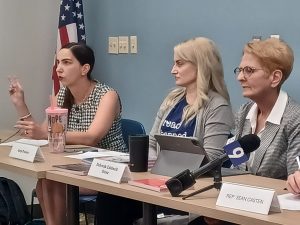Book banners blasted
By Kevin Beese Staff Writer — August 30, 2023
U.S. Rep. Sean Casten, D-Downers Grove, makes a point during a roundtable discussion about banning books held Tuesday, Aug. 22 at the Indian Prairie Public Library in Darien. Panel members to Casten’s right are (from left) Amy Franco, executive director of the Hillside Public Library, and Deborah Caldwell-Stone, director of the Office of Intellectual Freedom and executive director of The Freedom to Read Foundation. (Kevin Beese/Chronicle Media photo)
State Rep. Anne Stava-Murray, D-Naperville, doesn’t mince words when it comes to individuals looking to ban books from libraries.
“Books being viewed as inappropriate are the stories of people of diverse cultures and counting the historical abuses and wrongs,” she said at a Tuesday, Aug. 22 roundtable discussion on banning books. “They are the everyday lived experiences of members of the LGBTQIA+ community.
“Looking closely at what these people like to call morality reveals what it actually is: bigotry.”
The state representative, whose district includes the Indian Prairie Public Library in Darien, where the book-banning discussion took place, said it is important that bans are not supported by taxpayer dollars.
“That’s crucial,” she said.
Stava-Murray spearheaded legislation this spring promoted by Secretary of State and State Librarian Alexi Giannoulias that make state grants to libraries contingent on them having a written policy prohibiting the practice of banning books. Illinois is the first state to put such legislation into law.
U.S. Rep. Sean Casten, D-Downers Grove, who organized the roundtable, said it is important that young people see themselves in stories.
“Every teen fiction story is about the weird kid who finds out that being different is OK,” he said.
He said we learn by reading the stories and about the lives of people who are different than we are.
Casten said it is fine to have differences of opinion on an issue, but when events happen like Monday, Aug. 21 when the Oak Park Library stayed closed for the day because of threats of explosives in the building, people need to band together.
“It is deeply troubling that threats made the Oak Park Library close its doors,” Casten said. “I have had folks along the way on both sides of issues at my town-hall meetings and people have always been civil to each other. I don’t think we can ever have a civil conversation without us being civil to each other.”

State Rep. Anne Stava-Murray, D-Naperville, talks about her opposition to people looking to ban books, as Franco and Caldwell-Stone look on. (Kevin Beese/Chronicle Media photo)
He said people being unhappy with certain books has occurred throughout history.
“The Catholic Church was none too fond of Luther’s German translation of the Bible,” Casten said.
He added that “The Rabbit’s Wedding,” where forest animals get along, was banned from all Alabama libraries in 1958 because it was viewed as promoting integration.
Jodi Harap, chair of the Civic Affairs and Public Policy Committee for Equality Downers Grove, said a community awareness program was launched called “One Book, One Town,” where people read about book-banning and sexual orientation, and then got together in Downers restaurants and bars to talk.
She said people on both political fronts stopped “othering” with stereotypes about the other side and just talked about the issues.
“Books are a portal. We gain access to other worlds,” Harap said.
Deborah Caldwell-Stone, director of the Office for Intellectual Freedom and executive director of The Freedom to Read Foundation, said that in 2022, OIF received a record 1,269 book challenges. She said 2,571 unique titles were targeted for censorship, a 38 percent increase from 2021.
“There have always been challenges to books,” Caldwell-Stone said. “There have always been requests to reconsider books in libraries, but now what we’re seeing is a very significant trend where books are being challenged in mass.
“We are no longer seeing a single parent bring a concern to a librarian or a teacher about a book their student is reading. Ninety percent of the challenges brought to the Office for Intellectual Freedom last year were challenges to more than 100 titles at once. This is not evidence of a parent raising concerns about a book. This is evidence of an organized campaign to censor broad swaths of books based on their topic such as race, gender identity, sexual orientation or because they deal with topics like sexuality education or reproductive health.”
Ashley Stewart, director at the Caseyville Public Library District, said books cannot be removed because people are fearful of them.
“This doesn’t happen to other taxing districts,” Stewart said. “If we started to remove items just because we were fearful of them, there would be no roller coasters in theme parks and no lions in the zoo.
“Why are we allowing this to happen to libraries? We are here to protect people’s rights, legally.”
She said challenges to books are predominantly made by people who are not residents of the taxing district, eating up staff time and tapping library finances.
“You are costing those libraries money,” Stewart said.







